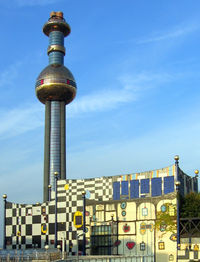
Photo from wikipedia
District heating and cooling networks based on trigeneration systems and renewable energy technologies are widely acknowledged as an energy efficient and environmentally benign solution. These energy systems generally include back-up… Click to show full abstract
District heating and cooling networks based on trigeneration systems and renewable energy technologies are widely acknowledged as an energy efficient and environmentally benign solution. These energy systems generally include back-up units, namely fossil-fuel boilers and electric chillers, to enhance system flexibility and cover peak energy demand. On the other hand, 4th generation district heating networks are characterized by low-temperature water distribution to improve energy and exergy efficiencies. Moreover, reversible heat pumps are a versatile technology, capable of providing both heating and cooling, alternately. In this paper, the integration of reversible heat pumps as single back-up units in hybrid renewable trigeneration systems serving low-energy micro-district heating and cooling networks is investigated. A detailed modeling of the system is provided, considering part-load and ambient condition effects on the performance of the units. Size and annual operation of the proposed system are optimized in a case study, namely a large office building located in Pisa (Italy), by means of a genetic algorithm-based procedure. A comparison with the conventional trigeneration system is performed in terms of economic and environmental perspectives. Results show that the integration of reversible heat pumps is an economically viable solution capable of reducing by 7% the equivalent annual cost, increasing the installed power of renewables up to 23%, and lowering by 11% carbon dioxide emissions, compared to the energy system with conventional back-up units.
Journal Title: Applied Sciences
Year Published: 2019
Link to full text (if available)
Share on Social Media: Sign Up to like & get
recommendations!